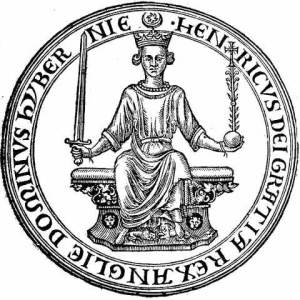It was Christmas 1223, the rebel alliance (the Schismatics) were on the run. They planned to meet in ‘great array’ at the castle of Northampton which was held by one of the rebels, Sheriff of Northampton, . However, they were beaten to it, and on 23 December, the young King Henry III arrived at Northampton Castle with Stephen Langton, Archbishop of Canterbury and many bishops, earls, barons and Knights intending to spend Christmas there. It was not the first time, the King had celebrated Christmas at Northampton, as de Breauté, had entertained him in the castle after the victory at the Battle of Lincoln Fair during Christmas 1217. The Dunstable annalist noted that neither in the days of his father (King John), nor afterwards, is such a feast known to have been celebrated in England. The next day Langton excommunicated all the rebels, and they were summonsed to appear before the King at Northampton on 30 December. When they arrived the Schismatics were shown letters from the Pope ordering the restoration of their castles to the King. They surrendered their castles and de Breauté and the Earl of Chester lost their sheriffdoms. It was not until mid Jan that Ralph de Trublevill was appointed as de Breautés replacement. The following June, de Breauté was convicted of 16 charges of seizing other peoples land. In reply he captured one of the judges Henry of Braybrook in Northants and threw him in the dungeon of his last surviving castle at Bedford. The King who had been at Northampton ordered his army to march on Bedford. It was to be one of the longest sieges during this period lasting eight weeks, with over 200 killed by the missiles of the defenders. After a fourth assault broke the walls de Breautés brother William and 80 knights were captured, refused pardon and hanged. De Breauté himself was exiled and died in 1226, allegedly from a poisoned fish.

Northamptonshire Battlefields Society
Dedicated to the research and preservation of Northampton's Battlefields and Heritage